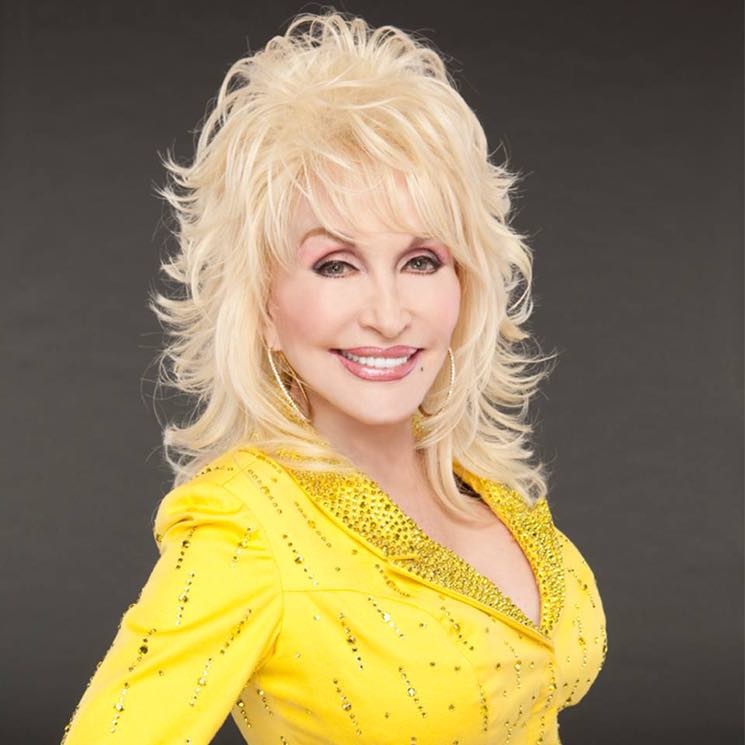Dolly Parton is such a pop culture icon you could almost be forgiven for forgetting she's first and foremost a singer-songwriter — not to mention one of the biggest-selling and most heralded in history. (We said almost.)
Behind the hair and the make-up, the stand-up comedy quips and the acting gigs is a deep catalogue of country, folk, pop, bluegrass and various combinations thereof. That's why when Dolly, at age 70, announced her first proper North American tour in decades, so many music fans jumped at the chance to check this living legend off their concert bucket list.
Parton started her career in the 1960s, after leaving her rural Tennessee home for Nashville the day after high school graduation. Stardom came first on television, as a regular guest on the Porter Wagoner variety show. When she decided to go solo (an infamous split documented with great hilarity on an episode of Drunk History), she wrote a song about Wagoner you may have heard of called "I Will Always Love You." A savvy businesswoman from the start, Dolly denied a request for Elvis to cover it when his manager demanded half the songwriting credit, a decision that paid off when Whitney Houston's version made them both millions in 1992.
There have been many other great hits — "9 to 5," the Kenny Rogers duet "Islands in the Stream," perennial karaoke fave "Jolene" — but with four decades of work to her credit, there are also dozens and dozens of lesser-known gems waiting to be discovered.
An essential Dolly Parton playlist is filled with songs that will tug on your heart and lift your spirit. She writes about love and jealousy and betrayal, extreme poverty and pulling up your bootstraps, standing up for yourself and your family and, above all, keeping a positive attitude about whatever life throws your way. Her new release, Pure & Simple, is a collection of love songs that she self-produced. It's her 43rd record — which means there are more than 40 other records to spin if you really want to hear the gospel according to Dolly. Below, find our Essential Guide to Dolly Parton.
Essential Records:
5. Dolly Parton's Greatest Hits
(1982)
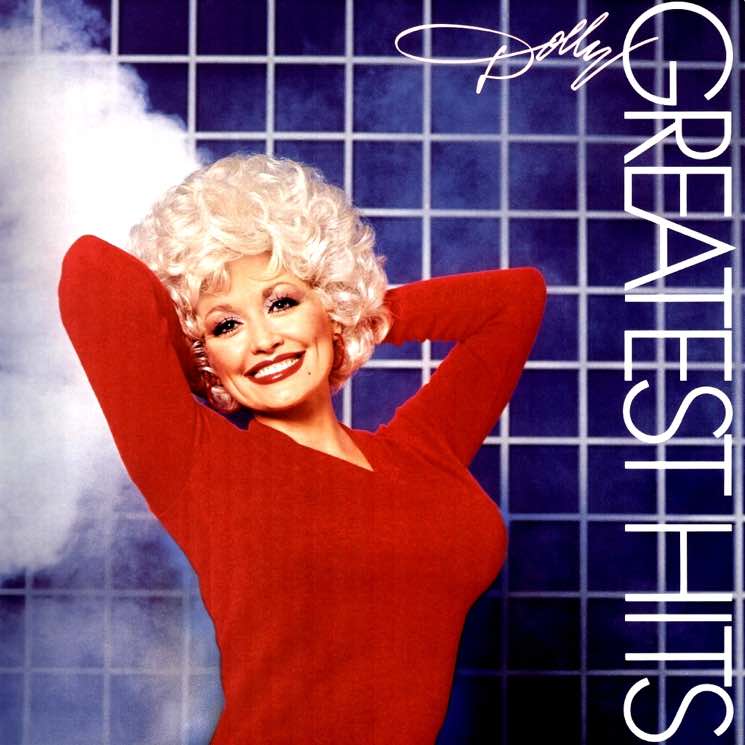
I wouldn't normally put a comp of previously released tracks on an essential albums list, but the best way to enjoy Dolly's most satisfying '70s pop songs is this 1982 greatest hits collection. (Don't let the poodle hair she's sporting on the cover photo scare you away.)
Kicking off with her famous working girl anthem "9 to 5" and running through rollickers like "Heartbreak Express" and "Two Doors Down," the swoony piano schmaltz of "Here You Come Again" and possibly the best tune ever written not only for but about the banjo, "Applejack," this is mostly upbeat music for road trip sing-alongs, sweaty house-cleaning sessions, post break-up dance parties — anywhere you need a little of Dolly Parton's trademark "put on your big girl pants and get out there and make the best of it" attitude in your life.
4. Dolly Parton, Linda Ronstadt and Emmylou Harris
Trio
(1987)
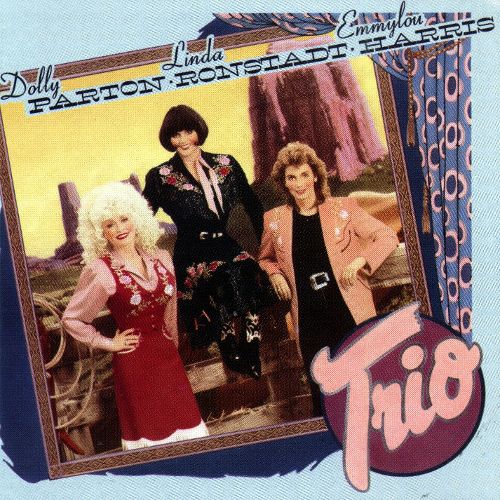
A musical threesome between Dolly and her friends/fellow superstars Linda Ronstadt and Emmylou Harris that got her back in the saddle after her many mid-'80s missteps (see below), Trio was a country smash and a pop crossover, nominated for Album of the Year at the Grammys alongside Michael Jackson, Prince, U2 and Whitney Houston. The big hit was a gentle cover of Phil Spector's "To Know Him is Love Him," featuring Ry Cooder on slide guitar, on which Dolly's larger-than-life persona fades away into the honeyed harmonies of the trio.
But there's plenty of room for Dolly to be herself here. You've got vulnerable lovelorn Dolly on the twangy tearjerker "Making Plans" ("I'm making plans to be lonesome / 'Cause you're making plans to leave"), then fearless, "wild mountain rose" Dolly on the spirited acoustic waltz "Wildflowers," an ode to her own escape from small town life that really should be a better-known anthem for wayward daughters and big dreamers everywhere. The 1999 follow-up Trio II is inessential unless you're trying to collect every cover of "After the Gold Rush," but a third is on the way this month, featuring previously unreleased tracks from the original recording sessions.
3. The Grass Is Blue
(1999)
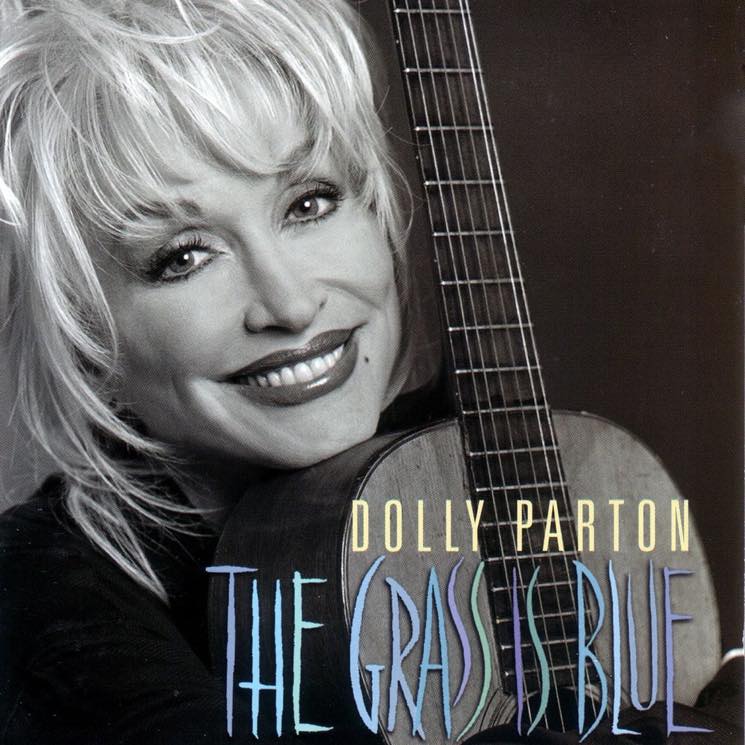
Dolly didn't need Rick Rubin or Jack White to reinvigorate her career — she just needed to go back to her roots. This Grammy-winning, critically acclaimed album may not please all bluegrass purists, nor did it bring the genre to the masses like say, O Brother, Where Art Thou, but it was a key stop on Dolly's return to relevance and wider respect.
An eclectic mix of standards (the chilling, don't-dare-touch-me-my-mother-will-cut-you "Silver Dagger"), originals ("Steady as the Rain") and unexpected covers (Billy Joel's "Travelin' Prayer," Blackfoot's "Train Train"), The Grass Is Blue is Dolly Parton stripped down to a vocalist and musician from rural Tennessee, paying tribute to her first musical love.
2. Jolene
(1974)

"Jolene. Jolene. Jolene. Jo-leeeeeeene. I'm begging of you please, don't take my man."
If you've ever tried to karaoke Dolly's most classic track, then you know it's deceptively complex, a shining example of her incredible vocal talents. The pleading lyrics — inspired by a bank clerk that used to flirt with her new husband — are simple and universal, and the guitar part's just so finger-pickin' good.
For complete Dolly virgins, the song is a key starting point. It's her most covered song — notable versions include ones by the White Stripes and Miley Cyrus, Dolly's goddaughter. (Personally, it was the doomy live version by the Sisters of Mercy of "Jolene" that first got me to notice Dolly beyond the wigs, and I will always love it. Hey, a segue!) This album is also the first appearance of "I Will Always Love You. If you're a sucker for the sentiment of that song but can't handle the bombast of Whitney's version, Dolly's original is beautifully understated, pure country magic. Dolly made many great records in the 1970s, but this one's a must-have for those two tracks alone.
1. Coat of Many Colors
(1971)
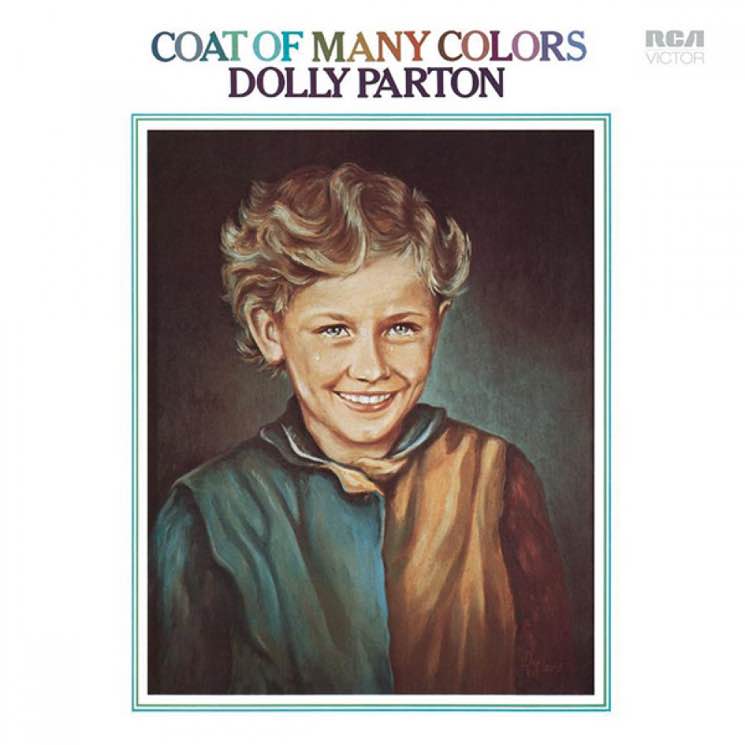
This one is Dolly's personal fave, and who am I to argue? It was her solo breakthrough — her eighth studio album, but the first to establish her as a star that didn't need Porter Wagoner.
But that's not why she loves it so; it's all about the opening title track, an autobiographical Appalachian folk ballad that's all rags, no riches, about growing up dirt-poor, and how Dolly's mother sewed her a winter coat out of clothing scraps that she loved so dearly it didn't matter how the other kids made fun of it. It's a song about family, love and pride. It gave her an origin story worthy of the Top 10, one that remains her personal theme song to this day.
Dolly wrote seven of this album's ten tracks, with the two other standouts offering different sonic and emotional takes on romantic rivalry: "Traveling Man" is rousing country rock about a mother and daughter chasing the same jerk, while "She Never Met a Man She Didn't Like" is as hurtin' a love song as there ever was. This is Nashville-era Dolly at her best, and at just under 30 minutes, it's all killer, no filler.
What to Avoid:
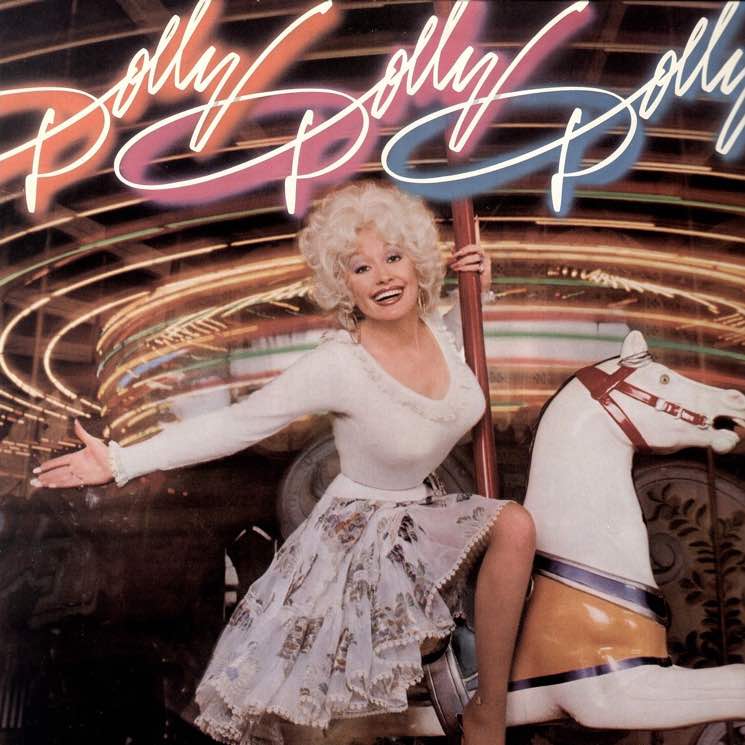
Like many artists, Dolly had a hard time navigating the 1980s. She had smash hits like "9 to 5" and "Islands in the Stream," but also chased trends that seem painfully dated today. Nobody asked for the Dolly Does Disco of 1980's Dolly, Dolly, Dolly, the uninspired covers of '50s and '60s songs on 1984's The Great Pretender or the glossy over-production on 1985's Real Love. All these titles are plentiful in $1 vinyl bins, but it's best to resist.
Further Listening:
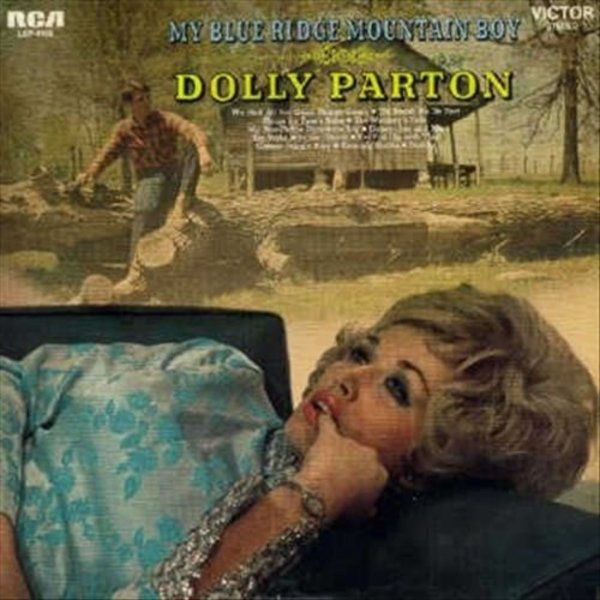
Like sad songs? Dive deep into Dolly's solo 1960s records and you'll find some pretty dark material, stuff that's far from her later shiny pop or feel-good country hits. 1968's "The Bridge" isn't just depressing, it's downright suicidal, with an ending that will still shock today. The title track to 1969's In the Good Old Days (When Times Were Bad) pulls no punches about living with hunger and poverty. On My Blue Ridge Mountain Boy (1969), you'll find "Gypsy Joe and Me," which you should probably skip if you're sensitive and a dog person. All of these showcase Dolly's pure voice and storytelling skills — no glitz needed.
Dolly released 13 studio albums with Porter Wagoner, and while some of it was kinda cornball in a Hee Haw way, 1971's The Best of Porter Wagoner and Dolly Parton collects the best of those early duets, like the gorgeous "Just Someone I Used to Know" and playful "Run That By Me One More Time."
Don't forget Dolly's girl power material, though. Starting with 1968's "Just Because I'm a Woman," which rather pointedly calls out the bullshit that is the Madonna-whore complex: "Now a man will take a good girl, and he'll ruin her reputation / But when he wants to marry, well, that's a different situation." She maintained that streak right up to 2008's "Backwoods Barbie," title track for the first album on her own indie label, Dolly Records, on which she proudly admits she's based her personal style on the small town tramp, and stands up for those who choose push-up bras and false eyelashes. With its mid-tempo twang and country radio gloss, it hasn't' exactly taken off as a Slut Walk anthem but it's sure ripe for a badass cover version. It sums up Dolly as much as "Coat of Many Colors" or any other number: "I might look artificial, but where it counts, I'm real."
Behind the hair and the make-up, the stand-up comedy quips and the acting gigs is a deep catalogue of country, folk, pop, bluegrass and various combinations thereof. That's why when Dolly, at age 70, announced her first proper North American tour in decades, so many music fans jumped at the chance to check this living legend off their concert bucket list.
Parton started her career in the 1960s, after leaving her rural Tennessee home for Nashville the day after high school graduation. Stardom came first on television, as a regular guest on the Porter Wagoner variety show. When she decided to go solo (an infamous split documented with great hilarity on an episode of Drunk History), she wrote a song about Wagoner you may have heard of called "I Will Always Love You." A savvy businesswoman from the start, Dolly denied a request for Elvis to cover it when his manager demanded half the songwriting credit, a decision that paid off when Whitney Houston's version made them both millions in 1992.
There have been many other great hits — "9 to 5," the Kenny Rogers duet "Islands in the Stream," perennial karaoke fave "Jolene" — but with four decades of work to her credit, there are also dozens and dozens of lesser-known gems waiting to be discovered.
An essential Dolly Parton playlist is filled with songs that will tug on your heart and lift your spirit. She writes about love and jealousy and betrayal, extreme poverty and pulling up your bootstraps, standing up for yourself and your family and, above all, keeping a positive attitude about whatever life throws your way. Her new release, Pure & Simple, is a collection of love songs that she self-produced. It's her 43rd record — which means there are more than 40 other records to spin if you really want to hear the gospel according to Dolly. Below, find our Essential Guide to Dolly Parton.
Essential Records:
5. Dolly Parton's Greatest Hits
(1982)

I wouldn't normally put a comp of previously released tracks on an essential albums list, but the best way to enjoy Dolly's most satisfying '70s pop songs is this 1982 greatest hits collection. (Don't let the poodle hair she's sporting on the cover photo scare you away.)
Kicking off with her famous working girl anthem "9 to 5" and running through rollickers like "Heartbreak Express" and "Two Doors Down," the swoony piano schmaltz of "Here You Come Again" and possibly the best tune ever written not only for but about the banjo, "Applejack," this is mostly upbeat music for road trip sing-alongs, sweaty house-cleaning sessions, post break-up dance parties — anywhere you need a little of Dolly Parton's trademark "put on your big girl pants and get out there and make the best of it" attitude in your life.
4. Dolly Parton, Linda Ronstadt and Emmylou Harris
Trio
(1987)

A musical threesome between Dolly and her friends/fellow superstars Linda Ronstadt and Emmylou Harris that got her back in the saddle after her many mid-'80s missteps (see below), Trio was a country smash and a pop crossover, nominated for Album of the Year at the Grammys alongside Michael Jackson, Prince, U2 and Whitney Houston. The big hit was a gentle cover of Phil Spector's "To Know Him is Love Him," featuring Ry Cooder on slide guitar, on which Dolly's larger-than-life persona fades away into the honeyed harmonies of the trio.
But there's plenty of room for Dolly to be herself here. You've got vulnerable lovelorn Dolly on the twangy tearjerker "Making Plans" ("I'm making plans to be lonesome / 'Cause you're making plans to leave"), then fearless, "wild mountain rose" Dolly on the spirited acoustic waltz "Wildflowers," an ode to her own escape from small town life that really should be a better-known anthem for wayward daughters and big dreamers everywhere. The 1999 follow-up Trio II is inessential unless you're trying to collect every cover of "After the Gold Rush," but a third is on the way this month, featuring previously unreleased tracks from the original recording sessions.
3. The Grass Is Blue
(1999)

Dolly didn't need Rick Rubin or Jack White to reinvigorate her career — she just needed to go back to her roots. This Grammy-winning, critically acclaimed album may not please all bluegrass purists, nor did it bring the genre to the masses like say, O Brother, Where Art Thou, but it was a key stop on Dolly's return to relevance and wider respect.
An eclectic mix of standards (the chilling, don't-dare-touch-me-my-mother-will-cut-you "Silver Dagger"), originals ("Steady as the Rain") and unexpected covers (Billy Joel's "Travelin' Prayer," Blackfoot's "Train Train"), The Grass Is Blue is Dolly Parton stripped down to a vocalist and musician from rural Tennessee, paying tribute to her first musical love.
2. Jolene
(1974)

"Jolene. Jolene. Jolene. Jo-leeeeeeene. I'm begging of you please, don't take my man."
If you've ever tried to karaoke Dolly's most classic track, then you know it's deceptively complex, a shining example of her incredible vocal talents. The pleading lyrics — inspired by a bank clerk that used to flirt with her new husband — are simple and universal, and the guitar part's just so finger-pickin' good.
For complete Dolly virgins, the song is a key starting point. It's her most covered song — notable versions include ones by the White Stripes and Miley Cyrus, Dolly's goddaughter. (Personally, it was the doomy live version by the Sisters of Mercy of "Jolene" that first got me to notice Dolly beyond the wigs, and I will always love it. Hey, a segue!) This album is also the first appearance of "I Will Always Love You. If you're a sucker for the sentiment of that song but can't handle the bombast of Whitney's version, Dolly's original is beautifully understated, pure country magic. Dolly made many great records in the 1970s, but this one's a must-have for those two tracks alone.
1. Coat of Many Colors
(1971)

This one is Dolly's personal fave, and who am I to argue? It was her solo breakthrough — her eighth studio album, but the first to establish her as a star that didn't need Porter Wagoner.
But that's not why she loves it so; it's all about the opening title track, an autobiographical Appalachian folk ballad that's all rags, no riches, about growing up dirt-poor, and how Dolly's mother sewed her a winter coat out of clothing scraps that she loved so dearly it didn't matter how the other kids made fun of it. It's a song about family, love and pride. It gave her an origin story worthy of the Top 10, one that remains her personal theme song to this day.
Dolly wrote seven of this album's ten tracks, with the two other standouts offering different sonic and emotional takes on romantic rivalry: "Traveling Man" is rousing country rock about a mother and daughter chasing the same jerk, while "She Never Met a Man She Didn't Like" is as hurtin' a love song as there ever was. This is Nashville-era Dolly at her best, and at just under 30 minutes, it's all killer, no filler.
What to Avoid:

Like many artists, Dolly had a hard time navigating the 1980s. She had smash hits like "9 to 5" and "Islands in the Stream," but also chased trends that seem painfully dated today. Nobody asked for the Dolly Does Disco of 1980's Dolly, Dolly, Dolly, the uninspired covers of '50s and '60s songs on 1984's The Great Pretender or the glossy over-production on 1985's Real Love. All these titles are plentiful in $1 vinyl bins, but it's best to resist.
Further Listening:

Like sad songs? Dive deep into Dolly's solo 1960s records and you'll find some pretty dark material, stuff that's far from her later shiny pop or feel-good country hits. 1968's "The Bridge" isn't just depressing, it's downright suicidal, with an ending that will still shock today. The title track to 1969's In the Good Old Days (When Times Were Bad) pulls no punches about living with hunger and poverty. On My Blue Ridge Mountain Boy (1969), you'll find "Gypsy Joe and Me," which you should probably skip if you're sensitive and a dog person. All of these showcase Dolly's pure voice and storytelling skills — no glitz needed.
Dolly released 13 studio albums with Porter Wagoner, and while some of it was kinda cornball in a Hee Haw way, 1971's The Best of Porter Wagoner and Dolly Parton collects the best of those early duets, like the gorgeous "Just Someone I Used to Know" and playful "Run That By Me One More Time."
Don't forget Dolly's girl power material, though. Starting with 1968's "Just Because I'm a Woman," which rather pointedly calls out the bullshit that is the Madonna-whore complex: "Now a man will take a good girl, and he'll ruin her reputation / But when he wants to marry, well, that's a different situation." She maintained that streak right up to 2008's "Backwoods Barbie," title track for the first album on her own indie label, Dolly Records, on which she proudly admits she's based her personal style on the small town tramp, and stands up for those who choose push-up bras and false eyelashes. With its mid-tempo twang and country radio gloss, it hasn't' exactly taken off as a Slut Walk anthem but it's sure ripe for a badass cover version. It sums up Dolly as much as "Coat of Many Colors" or any other number: "I might look artificial, but where it counts, I'm real."
